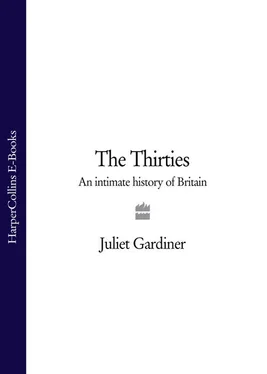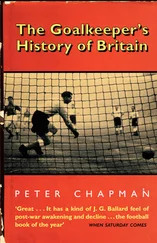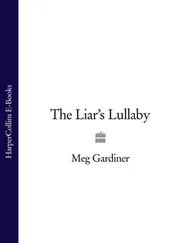In early 1930 Beaverbrook jumped the gun and announced the start of an Empire Crusade, since ‘The old Parties, slaves of tradition — impervious to new ideas — have let us down too, and … out of these old bottles it is no use looking for any new wine.’ Beaverbrook’s plan was to create a single economic unit from the variety of territories within the British Empire: the Empire would provide Britain with its food, while British industry would provide the Empire with the manufactured goods it needed, all behind a protective tariff barrier.
The Crusade, publicised in Beaverbrook’s Daily Express , and Lord Rothermere’s United Empire Party, supported by his Daily Mail (between them these two papers had a circulation of nearly four million), formed an uneasy alliance ‘to save the country … if necessary at the expense of wrecking every political party’ by putting up candidates in every constituency represented by a free trade Conservative (though in fact Rothermere was less concerned about Empire trade than about the loss of British influence in India). In March 1931 the Empire Crusade and the United Empire Party joined together to support an independent, anti-Baldwin Conservative in a by-election in the St George’s division of Westminster, the safest (and without doubt the richest) Conservative seat in the country, where the official Conservative candidate was Duff Cooper. Baldwin, who was being attacked from ‘under the piecrust’ in his own party, was so anxious about the result that he almost considered standing himself. Cooper was a former diplomat and MP, a skilful gentleman-who-lunched, and both the husband of one of the notable beauties of the age, Lady Diana Cooper, and a close friend of the Prince of Wales. In the event, in a campaign in which ‘the gloves were off’ and there had been ‘no baby or butcher-kissing’, the socialite Tory ‘slayed the dragons’, winning a resounding victory despite the ‘power without responsibility’, as Baldwin accused it, of the popular press.
What Mosley and Beaverbrook advocated in extremis — and tainted with their advocacy — also figured in John Maynard Keynes’ thinking, found instinctive support from the trade unions, and drew praise from radical young Tories like Robert Boothby and Harold Macmillan, whose Stockton-on-Tees constituency suffered deeply in the Depression, and who was exasperated by ‘a shadow Cabinet … worn to a shadow by its exertions’, a party with too many ‘open questions and too many closed minds’ — a criticism that could have been levelled at all three parties. Indeed Macmillan, who would in a little more than two more decades preside over Britain’s return to affluence, had been tempted to work with Mosley’s New Party himself, but had decided that ‘Men do better to stick to their own parties and try to influence their policies and their characters from within.’ Keynes too recognised much that he advocated in Mosley’s proposals. He found the memorandum ‘a very able document and illuminating’. And whereas before Mosley’s resignation the dispute had been over the efficacy of public works, afterwards the focus of the argument was increasingly about tariffs. Protectionist policies began to find support not just from industrialists, but also from the City of London, economists — including Keynes — and trade unionists. But not from Snowden. The Chancellor remained as intransigent as ever, opposed both to increasing government expenditure to create jobs and also to any form of tariff barriers. Irritated by sniping from his own backbenchers, Snowden decided to give them a cold douche of reality as he saw it. In February 1931, in response to Conservative charges that unemployment costs were too high, the government accepted a Liberal amendment and set up a committee to report on the matter.
Sir George May of the Prudential Assurance Company assumed the role of picky auditor of the government’s books, and his committee’s report was published on 31 July 1931, the day before the House rose for the summer recess. The deliberations of the men whom Beatrice Webb described as ‘five clever hard-faced representatives of capitalism and two dull trade unionists’ were ‘sensational’ (or ‘devilish’, as the Bank of England feared). The May Committee forecast a budget deficit of £120 million, and to avoid this it recommended total spending cuts of £96 million, two-thirds to come from unemployment benefit, plus cuts in public works projects and the pay of teachers, the police and the armed forces. ‘Luxury hotels and luxury flats, Bond Street shopping, racing and high living in all its forms is to go unchecked; but the babies are not to have milk and the very poor are not to have homes. The private luxury of the rich is apparently not wasteful expenditure,’ expostulated Beatrice Webb. The Cassandra-like May report, which was considerably exaggerated but not questioned at the time, could not have come at a worse moment. On 11 May the Credit-Ansalt, the most important bank in Austria, had failed, threatening the collapse of the German banking system. France started to withdraw gold in large quantities from London, and by the end of July MacDonald noted ‘Run on the Bank of England … £5,000,000 exported’ as foreign holders of sterling unable to withdraw their money from Germany withdrew it from London instead, in what Treasury officials warned was ‘an unprecedented exodus’. What had been a liquidity crisis was turning into one of confidence.
The Labour government was ill-placed to know how to restore it. In line with its election pledges benefit payments had been increased and access to benefits widened in January 1930, but the rapid escalation of unemployment and a shrinking tax base meant that the insurance fund was soon in deficit — by £75 million in 1930, and expected to rise. Unemployment benefits generally had soared as a cost to the Exchequer, from £12 million in 1928 to around £125 million in 1931. To its critics, unemployment insurance had become symbolic of the Labour government’s financial ‘unsoundness’ and ‘profligacy’. The Holman Gregory Commission on Unemployment Insurance, set up in December 1930, issued its interim report at the end of June 1931, calling for reductions in unemployment benefits and increases in unemployment insurance contributions. And when Lord Macmillan’s Committee finally issued its report in early July, ‘it was not exactly a document of limpid clarity and gave little practical assistance to a distracted administration’ (rather it gave the reverse, exposing the extent of London’s short-term foreign indebtedness to the government’s putative overseas lenders), while the minority report signed by Keynes and others saw the big picture and the long term, but was equally ‘of no immediate help’.
Indeed, even after the publication of the May Committee report (on which his views were not fit for publication), Keynes still thought that MacDonald should consult ‘a Commee. consisting of all ex Chancellors of the Exchequer’ about the issue. Beatrice Webb, writing her diary at 4 a.m. in the middle of the crisis, considered that ‘The only excuse for the Labour Cabinet is that no other group of men, whether politicians, businessmen or academic economists, whether Tory, Liberal or Labour, seem to understand the problem. No one knows either what the situation is … or the way out of it to sound finance. Even the fundamental facts of the situation are unknown.’
MacDonald set up a Cabinet Committee consisting of himself, Snowden, Henderson (who despite his position as Foreign Secretary discussing US loans considered that finance was a matter for the Treasury), J.H. Thomas and William Graham, President of the Board of Trade, to consider ways of reassuring foreign investors and easing the strain on sterling. ‘Will the country pull through?’ the Governor of the Bank of England Montagu Norman was asked on 15 August 1931. ‘Yes,’ he replied, ‘if we can get them [i.e. the government] frightened enough.’ Undoubtedly the government was frightened. It was also divided.
Читать дальше












